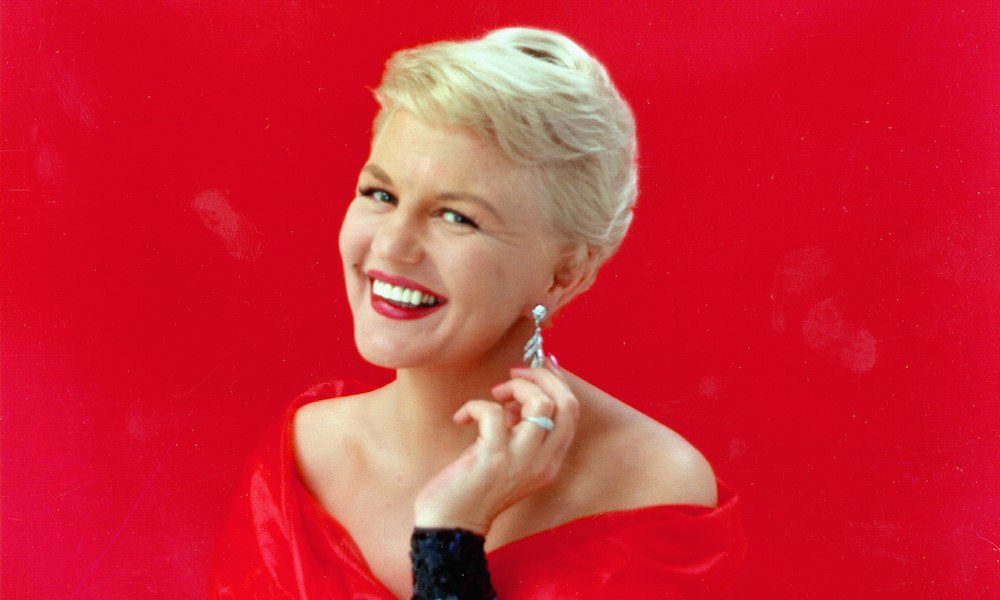Why Peggy Lee’s ‘Fever’ Still Smolders
A timeless juxtaposition of brazen lust and cool sophistication, ‘Fever’ remains the definitive hit for jazz singer Peggy Lee.

In July of 1958, nearly 20 years into her career, 38-year-old Peggy Lee scored her 48th Billboard hit with “Fever.” Known for her sultry delivery, impeccable timing, and bluesy intonation, Lee had already earned the respect of jazz greats while her commercial hits won her legions of admirers. Versatile and prolific, she has become one of the swing era’s most recognizable voices, famous for such hits as “Why Don’t You Do Right” and “It’s a Good Day,” the latter being one of her many original compositions.
Experimenting with her sound
As the swing era gave way to the rock’n’roll decade, Lee spent much of the 50s experimenting with her sound. She recorded Black Coffee, a landmark jazz-blues album, Sea Shells, a deeply unconventional proto-New-Age meditation, and, in 1955, she starred and sang in the Disney classic Lady And The Tramp. Yet it wasn’t until her smoldering adaptation of “Fever,” that Peggy Lee was able to put an indelible stamp on pop music forever, creating one of the most contagious jazz-pop tunes of all time.
“Fever” was originally written by R&B singer Eddie Cooley and pianist Otis Blackwell (under the pen name John Davenport). Blackwell made many contributions to the early rock’n’roll canon, including “All Shook Up,” “Don’t Be Cruel,” and “Great Balls Of Fire,” among others. The two co-wrote “Fever” in 1955 and it was recorded by the young R&B and rock’n’roll star Little Willie John, who was just 18 at the time.
Released on King Records, John’s interpretation was a well-conceived straightforward R&B arrangement featuring foreboding tenor saxophones, a heavy driving beat, and bluesy backing vocals. John’s crooning baritone soars passionately over smooth guitar chords and swinging finger snaps, displaying an unabashedly masculine distillation of passion and lust. John’s recording of “Fever” became one of his biggest hits, reaching No.1 on the R&B charts and No.24 on the pop charts in 1956.
Breathed new life into the R&B classic
Heating up the summer of 1958, Peggy Lee’s cover of “Fever” not only breathed new life into the R&B classic, but revitalized her career. While Lee remained a favorite singer among jazz fans, her swing-era pop vocals had begun to lose relevance among younger audiences. Her subdued yet sensual take on “Fever,” however, spoke directly to a younger crowd while bearing all the wit and sophistication of the coolest jazz records.
Inspired by a slightly more rockabilly version of “Fever,” recorded by Ray Petersen in 1957, Lee eventually heard John’s version and decided to record her own take on the tune that would filter this edgy teen angst through the cool sophistication of a female jazz master at the top of her craft. With hired songwriter Sid Kuller, Lee came up with new lyrics that chronicled lovers through the ages.
Tapping into the rock’n’roll audience
Lee insisted on a stripped-down arrangement even when her producer Dave Cavanaugh and conductor Jack Marshall wanted it to be bigger and more complex. Lee was determined to project a cool yet earthy mood using only bass, percussion, finger snaps, and her languorous voice. The finger snaps, sparse arrangement, and satirical storytelling echoed the voice of the Beat Generation. Lee understood this new era and her place in it, and wanted to tap into the burgeoning rock’n’roll audience. She used Beat slang in lyrics such as “Julie, baby, you’re my flame” and “Daddy-o, don’t you dare,” as she swings in a perfect R&B tone over a West Coast “cool school”-inspired arrangement.
During a time when teen rebellion reverberated through wailing guitars and saccharine crooning, Peggy Lee’s “Fever” was a sophisticated showstopper that stood out in the youth market while teeming with innuendo that made parents uncomfortable. A brilliant culmination of experimentation and pop excellence, Lee’s “Fever” was the subversive voice of sexuality under the repressive spirit of the conservative 50s: a signpost for the sexual revolution that was to come.
Her signature work
Peaking at No.8 on Billboard in July 1958, “Fever” became Lee’s most successful song and is often cited as her signature work. It showcases the brilliance of her vocal abilities as well as her talent as a writer and arranger. The song was nominated for Record Of The Year, Best Female Vocal Performance, and Best Arrangement at the first-ever Grammy Awards. While Lee had been the driving creative force behind her version, Jack Marshall was given the nomination. Failing to copyright her new lyrics, Lee’s additions were credited to the original writers, Cooley and Blackwell.
In the years following the success of “Fever,” Peggy Lee continued to write songs and experiment with different covers, imbuing each one with her playful charm, but “Fever” remains Peggy Lee’s defining recording. It’s been featured heavily in film and TV, and has inspired countless interpretations by artists ranging from Elvis Presley to Beyoncé. As the jazz-pop classic approaches its 60th anniversary, it remains a timeless juxtaposition of brazen lust and cool sophistication.
Listen to “Fever” and other iconic hits on the new Ultimate Peggy Lee collection.













g capp
April 29, 2019 at 9:20 pm
one of best!
Dwayne L . Richardson
February 12, 2021 at 10:53 pm
I beg to differ , the original by
Little Willie John smolders , Peggy Lee had a slight temperature compared to Little Willie John original comparatively speaking Little Willie was in the
ICU
Wrecksracer
July 26, 2022 at 6:07 am
as a native Detroit-er, I like the Little Willie John version best. I consider Peggy Lee’s version the white-washed version. It’s like Pat Boone’s version of Tutti Fruitti. Sorry Peggy!